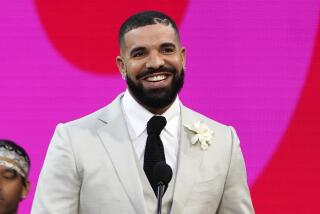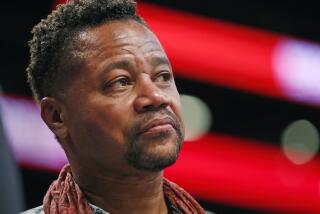Ruling that ‘Blurred Lines’ copied Marvin Gaye song rocks music world
Alone in a Burbank studio, Pharrell Williams started by “surfing around” for a drumbeat.
The Grammy Award-winning songwriter, who has sold more than 100 million records worldwide, then looked for chords that felt good. Once he got a “groove” going, he later recalled, he let it speak to him. When he found a melody “that sticks and shimmers,” it told him what the song should be about, and he started scratching down lyrics.
In all, it took less than an hour, Williams testified this month. The product, “Blurred Lines,” went on to become the biggest song of 2013 and bring in millions of dollars each for Williams, singer Robin Thicke and the record company.
That obscure process — “magic,” Williams’ attorney called it — and what, if any, part the late soul singer and songwriter Marvin Gaye played in it were the subject of a two-week-long trial in a downtown federal courtroom in which attorneys, music experts, valuation experts and musicians argued over the age-old question of where inspiration ends and theft begins.
On Tuesday, a federal jury decided that “Blurred Lines” had copied Gaye’s 1977 chart-topper “Got To Give It Up,” and found that Williams and Thicke should fork over nearly $7.4 million in unpaid licensing fees and a chunk of the song’s profits. They absolved rapper T.I. and the record companies behind the song of infringement. Gaye’s daughter, Nona, clung to her attorney and sobbed when the verdict was read.
The outcome could reverberate throughout the music industry, given how prevalent it is in the business to draw inspiration, and sometimes more, from earlier works.
When Sam Smith agreed earlier this year to share royalties from his song “Stay With Me” after comparisons to Tom Petty’s “I Won’t Back Down,” the older musician wrote on his website that it was a “musical accident,” and sounded a sympathetic note: “All my years of songwriting have shown me these things can happen.”
Just last year, British singer-songwriter Ed Sheeran told a Times reporter his dance hit “Sing,” produced by Williams, was modeled after Justin Timberlake’s “Justified” and born out of the question, “What if James Taylor made a club record?”
Last week during the trial, Williams’ attorney compared the music industry’s use of familiar themes to Hollywood’s tried-and-true romantic comedy formula of unattractive boy meets beautiful girl, and wins her after a series of happenings — “Sleepless in Seattle,” “Knocked Up” and “When Harry Met Sally.”
“We are like dwarfs sitting on the shoulders of giants,” Howard King said, quoting a 12th century text. “There are no virgin births in music.”
Los Angeles composer and producer Gregory Butler said Tuesday afternoon that his friends and colleagues in the industry were stunned by the verdict.
“You’ve made it illegal to reference previous material,” said Butler, also a managing director at music startup WholeWorldBand. “I’m never going to come up with something so radically different that it doesn’t contain references to something else.”
Joe Escalante, an early member of the Vandals punk rock band and an entertainment law attorney, said he was concerned that the jury’s decision had been driven by emotion rather than what’s protected under copyright law.
“This may put a smile on the Gaye family’s face, but it’s a dark day for creativity, and in the end, this will be a net loss for music fans,” he said. “Good news for lawyers and the bitter everywhere.”
Industry veteran Irving Azoff, who manages the Eagles and is the chairman and chief executive of Azoff MSG Entertainment, said such disputes were normally resolved between music business insiders based on how many notes in a row were shared by two songs.
“It’s never been based on a jury’s opinion,” said Azoff, whose firm represents Williams on performance rights issues. “If we’re now entering into a gray area, that’s very scary.”
On the other hand, a veteran music industry executive said that protecting creative work was just as important to musicians, and that inspiration bordering on copying was becoming too common.
“Somebody should be protecting that,” said the executive, who asked not to be named because he might work with those involved in the case in the future. “If it has a chilling effect on copyright infringement, that should happen.... Stopping theft is what we’re talking about.”
The Gayes’ attorney, Richard Busch, said after the verdict that the trial was not about inspiration or the music business, but the copying of one song.
“While Mr. Williams’ lawyer suggested in his closing argument that the world would come to an end and music would cease to exist if they were found liable, I still see the sun shining, I still see the wind blowing,” he said.
As is typical in copyright cases, Busch said he would request an injunction from the court to stop further sales of “Blurred Lines,” possibly opening negotiations about profits from the song going forward.
Williams, Thicke and T.I., whose legal name is Clifford Harris Jr., released a statement saying that “Blurred Lines” was an original creation and that they were exploring legal options following the verdict. The jury’s finding, the artists said in the statement, “sets a horrible precedent for music and creativity going forward.”
Jurors concluded that Thicke and Williams had not been willful in their infringement, but at the same time also said that the infringement had not been “innocent.” On a second Thicke song that was also at issue, they found that “Love After War” did not infringe on Gaye’s “After the Dance.”
The eight-person jury, most of whom appeared to be more of Gaye’s generation than Thicke and Williams’ demographic, heard “Blurred Lines” several times during the trial and twice watched the raunchy music video — but never got to hear the full recording of “Got to Give It Up.” Because laws when Gaye wrote the song allowed only the sheet music composition, not the sound recording, to be copyrighted, jurors heard short snippets and a stripped-down version created by Thicke and Williams’ musicologist with just Gaye’s vocals over a bass line and chords on a keyboard.
Busch said there were copied elements — including the bass and keyboard line, the hook and a repeated theme — in all but two bars of “Blurred Lines.”
As much as the songs themselves, the trial became about the credibility and egos of the artists behind “Blurred Lines.” Thicke and Williams disavowed statements they made over and over again in press interviews about how they talked about or channeled Gaye as they wrote the song.
Under oath on the witness stand, Thicke said he had been drunk and high the day the song was written and during his press interviews, and had sought to undeservedly take credit even though he had written none of it.
He said he had misremembered the events of the night and only realized his error when he heard Williams’ recollection at a deposition. He lied to Oprah Winfrey, Thicke said, when he told her half his music was inspired by Gaye.
Williams testified that he made the connection to Gaye only in hindsight, and that though he was raised listening to Gaye and respected the musician “beyond words,” he did not take from his music.
“As a creator, you get a kick out of bringing new things into the ether,” he told jurors.
Also splayed out before jurors in a rare fashion were the financial details behind the song. The song brought in $5.6 million for Thicke, $5.2 million for Williams and another $5 million to $6 million for the record company, as well as an additional $8 million in publishing revenue.
Douglas Bania, a copyright valuation expert called to the stand by Thicke and Williams’ attorney, told jurors that his analysis showed that much of the song’s lucrative success also had to do with the video, which featured nearly nude supermodels and became a viral hit, as well as marketing and social media campaigns.
Busch challenged that notion, saying that plenty of heavily marketed intellectual property doesn’t sell.
“Are you truly telling me that music doesn’t sell a song?” he asked Bania. “The young women who were either naked or scantily clad ... did those women come with the track?”
Nona Gaye, one of three Gaye children who prevailed in the case, said the family had taken on music industry giants for her father, who died in 1984.
“That’s the reason why we did this,” she said, her voice shaking, outside the courthouse Tuesday. “Because he can’t do it for himself.”
More to Read
Start your day right
Sign up for Essential California for news, features and recommendations from the L.A. Times and beyond in your inbox six days a week.
You may occasionally receive promotional content from the Los Angeles Times.









